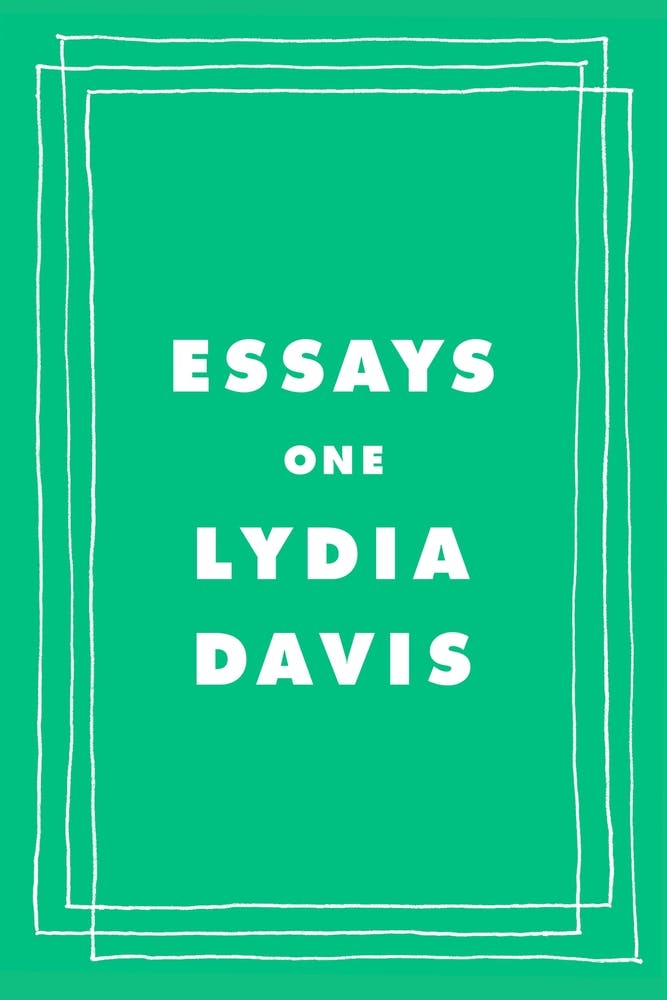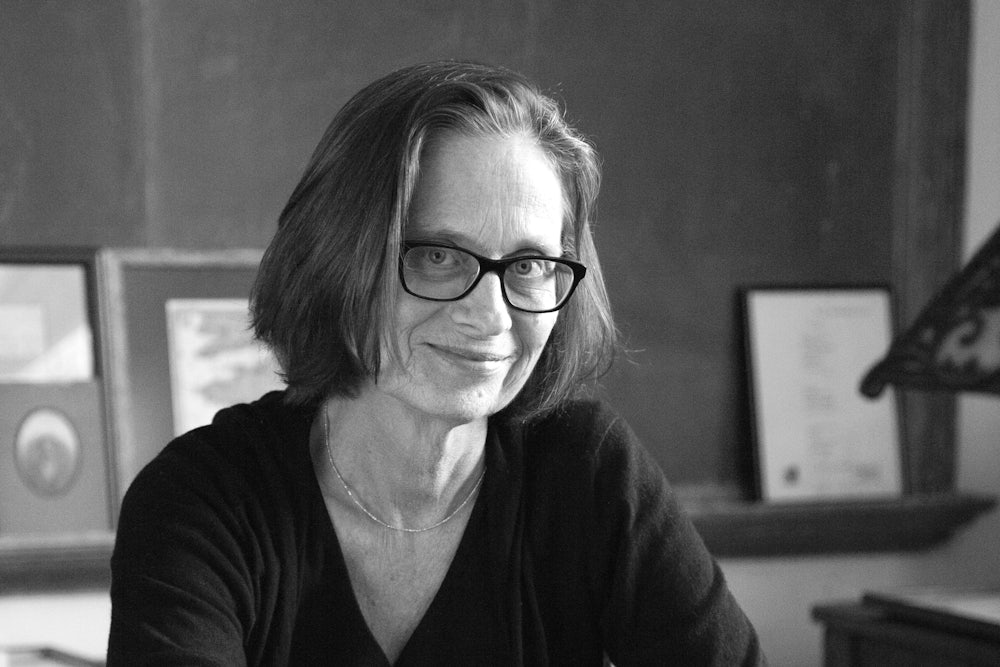Lydia Davis would begin this review simply. So I will. So I am. So I have. Which tense is right? I suppose they all are, or each might be, depending on what I mean to do here. I suppose the fact that I’m thinking about this at all is because I’ve been reading Lydia Davis.

Her latest, Essays One, collects essays and reviews and talks and some of what I’d consider ephemera. It’s a chubby volume, and as the title promises, there will be a second, which is to focus on Davis’s work as a translator (no slouch—she’s done Proust and Flaubert).
Essays One is a miscellany by definition. It contains the introduction to a collection of Lucia Berlin stories, and some thoughts on Thomas Pynchon’s early work, and a careful study of Dutch snapshots from photography’s earliest days. The book’s raison d’etre is not to preserve these individual pieces—though some of what’s in here is quite worth saving—it’s to elevate Davis to the office of a Great American ... well, again, it’s hard to know what word to use. Let’s just agree that Davis, now 72, is an elder stateswoman of American letters.
She began her career writing short stories. Her first major press collection, Break It Down, shows an unorthodox mind at work, though her more experimental prose was ahead of her. This was followed by The End of the Story, a book that feels like an outlier in Davis’s oeuvre, but one I love. It is surely one of the best novels ever written on the subject of romantic obsession.
The fictions collected in Almost No Memory, Samuel Johnson is Indignant, Varieties of Disturbance, and, most recently, Can’t and Won’t, are the Davis I suspect most readers know: epigrammatic confections, one-liners, bits of found text, dense little narratives like some space-age vision of astronaut food: a three-course meal in one easy-to-swallow capsule. The title story of Samuel Johnson reads in its entirety: “that Scotland has so few trees.” It’s a joke! But it’s also not: Lydia Davis can be funny, but the overall intent is serious.
Davis’s fiction can seem light by virtue of its brevity. There’s confusion, which she addresses in Essays One, about whether it’s poetry instead of prose. It somehow follows that when you read her at length—these essays run to more than 500 pages—you realize just how chewy and complicated she is.
There’s a loose organizing principle: reflections on other writers, followed by those on visual art, on the sacred, on her own work. It’s a pleasant surprise that Lydia Davis is so engaging on the subject of Lydia Davis. Few writers have anything useful to add to contextualize their art. Then again, few writers make the kind of work that really needs some explication. Davis, we learn, might turn an email into a story, or dig through Flaubert’s letters to turn anecdotes from his correspondence into tiny stories of her own, or create drama out of an interview by withholding the questions and offering only the answers. It’s refreshing to hear her explain herself.
Or, most of the time anyway. “To me, experimental implies that the writer had a plan to test some preconceived writing strategy and see if it would work; that what resulted might or might not prove anything, and might or might not be successful,” Davis writes. “Since I generally prefer to start a piece of writing without much of a plan, and not to be sure exactly what I’m doing, I do not consider the stories that result in any way experimental.” I suppose I buy this. Surely Davis is aware that interrogating the received idea of fiction—her project, I think—is an experiment.
But Davis knows her readers have questions, and she’s willing to entertain them. I was most engaged by five master classes the author delivered at New York University, in 2012-2013. My preference for these talks might betray my own bias as a writer of fiction. I not only read these, I re-read them. Anyone weighing going into debt for an MFA should know that they can instead buy this book.
Davis is a writer of such care that she instructs by example. She tells us, “It is hard for me to let a sentence stand if I see something wrong with it. Even when I’m writing a grocery list it is hard for me not to correct a misspelling.” While her economy (in her fiction, at least) seemed to presage the internet era’s fidgety attention span, her meticulous consideration of every word is less a throwback than a charming idiosyncrasy. All the writers shoveling copy into the maw of the world wide web (including me) should probably take a cue from her.
She’s so deeply cerebral it’s perhaps counterintuitive that Davis is a companionable presence. She’s erudite, with catholic interests, and earnest but not humorless. This is the kind of book you could read alone in a restaurant and feel you’re lost in a stimulating conversation. We all take it on faith that Flaubert is a genius, but it’s still startling to hear Davis explain it: “If he had a lifelong habit of watching for stupidity and relishing examples of it, he found it in ‘all of humanity’; all of humanity was bourgeois.”
As a critic, she is perceptive, yes, but also truly engaged. Davis writes beautifully about the painter Alan Cote; he’s an artist I’ve never even heard of, but I was thrilled to tag along as she delved into his work. She takes her time, weighs every word, interrogates her own thoughts, then shapes them into argument. I covet her ability to write and to commit to the work at hand. I spent two weeks with Essays One; Davis would probably have spent much longer with a book she meant to review. Alas, we can’t all be Lydia Davis, but thank god we have her.
